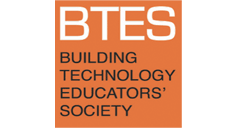
The Building Technology Educators’ Society serves the community of academics and professionals who are involved most directly with the construction and structure of the built environment. The mission of BTES is to promote and publish the best pedagogic practices, relevant research, scholarship, and other creative activity to facilitate student learning, advance innovation, and enhance the status of building technology disciplines in the profession at large.
This is an open access conference proceedings which means that all content is freely available without charge to the user or his/her institution. Users are allowed to read, download, copy, distribute, print, search, or link to the full texts of the articles, or use them for any other lawful purpose, without asking prior permission from the publisher or the author.
2025
Full Proceeding
Proceedings of the 2025 Conference of the Building Technology Educators' Society
Terri Meyer Boake and Jeanne Homer
2025-08-31 2025
Papers
Concrete City: Chicago's Role in Concrete High-Rise Engineering
Thomas Leslie and Carol Willis
2025-08-31 2025
Beyond Aesthetics: Adaptive Facades as a Bridge Between Climate Responsiveness and User Experience
Peter S. Raab
2025-08-31 2025
Assessment of Indoor Environmental Quality in Educational Settings: Insights in level of stress, attention and engagement
Marjan Miri, Carlos Faubel and Antonio Martinez-Molina
2025-08-31 2025
The B-TEAM: Curriculum Development through Mutual Mentoring
Robert Williams, Jordan A. Kanter, Hellen Awino, Caryn Brause and Ray Mann
2025-08-31 2025
Political Economy in Introductory Technical Architecture Education: Experiences and Pedagogical Methods
Keefer Dunn
2025-08-31 2025
The Dialectics of Text and Image: From Mechanical Reproductions to AI Image Productions
Ehsan Sheikholharam
2025-08-31 2025
From calculations by hand to hands-on explorations: Re-thinking structural design pedagogy through interactive computational tools
Juney Lee
2025-08-31 2025
Integration and Synthesis: Teaching the Parts in Anticipation of the Whole
Mehdi Ghiai and Liane Hancock
2025-08-31 2025
Gray-boxing: Integrating Structural Behavior into Architectural Education
Reese Greenlee
2025-08-31 2025
Discovering and Translating Building Technology through a Cultural and Technological Investigation of Carnival
Annicia Streete
2025-08-31 2025
Bridging Technology and Sustainability: 3D-Printed Clay Formwork in Architectural Pedagogy
Erin Hunt
2025-08-31 2025
Merging Tradition and Technology: A Zero-Waste Approach to Customizable Clay Facade Systems with Integrated Vegetation
Mark Segovia, Desiray Rodriquez and Erin Hunt
2025-08-31 2025
Ecological Performance Through Design and Digital Fabrication of Bird Habitats
Niloufar Emami
2025-08-31 2025
Volumetric Construction: Learning from Sweden, Finland, and the United States
Michel Mounayar
2025-08-31 2025
PANTHEON 1.0 or: Reflections and Speculations on the Roman Construction and Casting of the Pantheon Dome
Regin Schwaen and Nick Wickersham
2025-08-31 2025
Architecture + Fashion = Cultural Expression of the Building Envelope as Explored in the Architectural Design Studio
Paolo Sanza and Awilda Rodriguez
2025-08-31 2025
Go Big or Stay Home? Structural Understanding Through the Accessibility of Precedent
Stephanie Bunt
2025-08-31 2025
Earth Construction: Alternative Building Strategies for More Equitable Housing
Robert Holton
2025-08-31 2025
The 100-Mile Building: Bioregional, Biogenic Architecture
Clare Olsen and Angela Bracco
2025-08-31 2025
Enhancing Rapid-Build Structural Assemblies with Hybrid Hardwood-Softwood Mass Timber: A Cross-Cultural Comparison
Edward Becker
2025-08-31 2025
From the Lab to the Land: Challenges of Upscaling Biobased Materials for Architecture
Mercedes Garcia-Holguera
2025-08-31 2025
Learning from Limitations: Design and Construction of a Rammed-Earth Community Kitchen
Hannibal Newsom, Christina Chi Zhang and Lauren Scott
2025-08-31 2025
Collaborative Learning in Design Build Studio Culture
Sara Codarin, Karl Daubmann, Scott Shall and Masataka Yoshikawa
2025-08-31 2025
Collaborative Materiality: A New Outdoor Lab to Study Iridescent Nanocellulose
Shawn Protz, Sarah Queen, Nathalie Lavoine, Harish Palani, Sea Vang and Kunal Bhardwaj
2025-08-31 2025
The Passive Solar Greenhouse and the Fluid Column: Two Case-Studies in Integrated Design-Build Pedagogy
Danny Wills
2025-08-31 2025
Integrating Material Selection and Specification Writing into Architecture Education and Practice
Jessica Garcia Fritz and Mariangel Meza Santiviago
2025-08-31 2025
Integrating regenerative design with adaptive thermal comfort: insights for sustainable rural housing in India's composite climate
Parvesh Kumar, Vijayaraghavan M. Chariar and Chitrarekha Kabre
2025-08-31 2025
Updating Materials and Methods of Construction Pedagogy for Digital Natives: A Critical Adaptation from Textbooks Tests and Essays to Digitally Fabricated Physical Materials Systems Models, Discursive Video Blogs, and Gamified Computational Simulation
Angus Eade
2025-08-31 2025
Case Study of an Adaptive Reuse Project using Embodied Carbon Visualizations as part of a Holistic Design Process
M. Naomi Darling, Garth Schwellenbach, Mitsuki Ito, Xinyi Qi and Lauren Madsen
2025-08-31 2025
Design Optimization for Resilient Building Design in Coastal Environments
Soo Jeong Jo, Dongkeun Lee and Farzaneh Oghazian
2025-08-31 2025
Engaged Practices: A Meditation on Design-Build Pedagogy and Public Health
Hannibal Newsom
2025-08-31 2025
Greening Building Enclosure for Improved Footprint: Reducing the Environmental Impact of Green Facades and Living-Wall Systems LWS
Ashraf Ragheb
2025-08-31 2025
Enhancing Energy Efficiency in Affordable Housing: A Comparative Study of Construction Methods
Layla Iskander, Carlos Faubel, Antonio Martinez-Molina and Saadet Beeson
2025-08-31 2025
Empowering Architectural Performance through Biophilic Shading and Hands-On Teaching
Nea Maloo and Danny Sagan
2025-08-31 2025
Sustainable Building Envelopes: Exploring Alternative Materials for Passive Thermal Regulation Through Hotbox Testing
Safiyyah Khan and Mili Kyropoulou
2025-08-31 2025
ethinking Sustainability: A Pedagogical Approach to Explore Design for Disassembly
Anahita Khodadadi
2025-08-31 2025
Holistic evaluation of formwork materials for low-carbon concrete
Alexandra Daley, Mohamed Ismail and Leopold Wehner
2025-08-31 2025
Hybrid Typologies: Quantifying the Operational Energy, Embodied Energy, and First Cost of Emergent Light-Wood-Framed Multifamily Construction Methods
Grant Mosey
2025-08-31 2025
Posters
3D Motion Graphics Using Blender to Illustrate Structural Concepts
Deborah J. Oakley
2025-08-31 2025
Let Me Go Semi-Outside: A Human-Centric Comparison of Outdoor Comfort Models in a Hot-Humid Semi-Outdoor Environment During Summer and Mid-Season
Cameron Spencer Klassen, BJ Tamber-Rosenau and Mili Kyropoulou
2025-08-31 2025
If You Build It, Will It Make a Sound? Learning through Acoustic Testing of Mass Timber Floor Assemblies
Dustin Albright and Kylee Russell
2025-08-31 2025
Forensics in Process: A Heuristic Approach Combining Topology Optimization and Computational Fluid Dynamics
Angus Eade
2025-08-31 2025
Evaluating Visual Privacy in Urban Apartment Housing
Terri Peters and Florencio IV Tameta
2025-08-31 2025
Evaluating Healthy Housing Parameters in Co-op Housing Examples in Canada
Terri Peters and Matt Lokun
2025-08-31 2025
